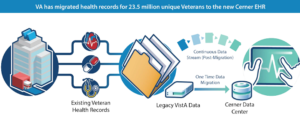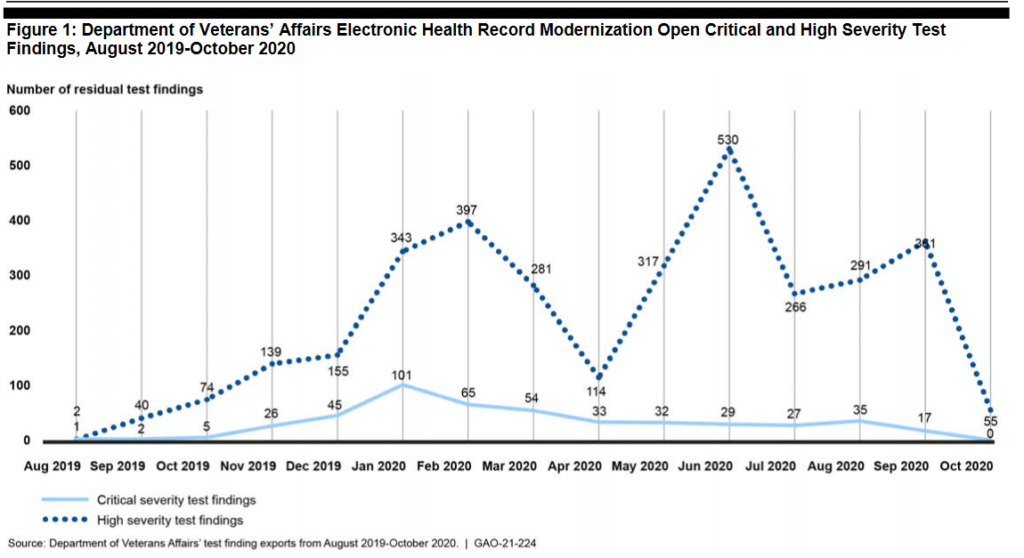
In 2019, 23.5 million veterans’ health records were transferred to a shared data center with the DoD in an anticipation of a “go-live” of VA’s EHR solution in 2020. Now, the project is being halted for review. Graphic from July 25, 2019, VAntage Point blog.
WASHINGTON — VA has put the nationwide rollout of its new electronic health record (EHR) modernization program on pause to conduct an assessment of challenges at the pilot site at the Mann-Grandstaff VAMC in Spokane, WA.
The 12-week strategic review begun last month follows reports from oversight groups suggesting that VA was moving forward too quickly with its EHR.
The EHR launched at Spokane in October 2020, and the rollout was scheduled next for a group of facilities in VISN 10, which include Columbus, OH. VA already has launched components of the system at those facilities. After that the rollout will continue at facilities in the Pacific Northwest.
The launch in Spokane has not been without challenges, however. In February, the Government Accountability Office (GAO) released a report tallying issues found with the system prior to and following the Spokane launch. The report recommended that VA pause the rollout while those findings are addressed.
VA’s response at the time was that the issues would be resolved before the Ohio rollout and that a pause wasn’t necessary. The department has since changed its stance.
“We’re seeing productivity declines bigger than I would have anticipated and continuing longer than I would have anticipated,” VA Secretary Denis McDonough testified at a House Veterans’ Affairs Committee hearing last month. “That’s why we’re taking this opportunity. Let’s lift this up and take a hard look at it.”
Asked what VA was hoping to learn over the three-month pause, McDonough said the department wants to make sure those people using the system are not just comfortable with it but enthusiastic.
“I want to make sure we have success learning from our clinicians and practitioners on the ground in Spokane such that they become advocates as we go to Columbus and from Columbus back to Walla-Walla,” McDonough explained. “So we’re building a coalition of practitioners [and] that they end up being advocates for the continued expansion of the effort.”
A regular criticism from legislators and oversight groups during VA’s several attempts at replacing its EHR system has been a lack of input from end-user staff during the development process.
“VHA customers [need] a big seat at the table but also an ability to sit with people at their shoulder to test and run this thing,” McDonough said. “At the end of the day, this is about service provision and outcomes for the vets. The best [way to do that] right now is making sure that our [providers] understand what this means and understand its benefits. If we don’t, we’re going to be in this box for a long time.”
Despite this delay, McDonough told legislators that he was not ready to consider changing the overall schedule of the rollout.
He did admit that the final price tag on the EHR could change. That cost has been estimated at $16 billion spread between 2018 and 2028. That includes a $10 billion contract with CERNER, the company that designed the EHR, and $6 billion for hardware upgrades and project management. If the Spokane launch is any indication, the project management aspect of the rollout may be what balloons over time, McDonough admitted.
“One of the things we’re learning is that it does appear to be requiring a lot more people on the target in Spokane right now then the planning anticipated,” McDonough told the committee. “If there’s more people and time on the target, I worry about what that means on the spend rate. We need to figure out precisely what the use case in Spokane is telling us and what does that mean for the larger effort. … This effort has gone on too long, and it’s been too costly.”
Another oft-repeated criticism of previous large-scale technology efforts at VA has been inconsistent or absent leadership to see a project through to completion. VA is currently looking for a new professional to lead VHA and, thus, be the main advocate and overseer of the EHR rollout.
Last month, the department established a commission to identify candidates for the under secretary for health, who oversees the $61 billion healthcare system. “By law, the appointment is made without regard to political affiliation and solely on demonstrated ability in the medical profession, policy formulation and healthcare administration and fiscal management,” according to a statement from VA.
The under secretary role has officially been vacant since January 2017 when David Shulkin was appointed VA secretary by President Donald Trump. The role requires Senate confirmation and has been filled with temporary replacements for the last four years.
Carolyn Clancy, MD, held the interim role until July 2018, when Richard Stone, MS, was brought into the position. During the Trump administration, he held the position under the label “executive-in-charge.” When President Joe Biden took office, he decided to keep Stone on during the transition period with the acting under secretary title.



